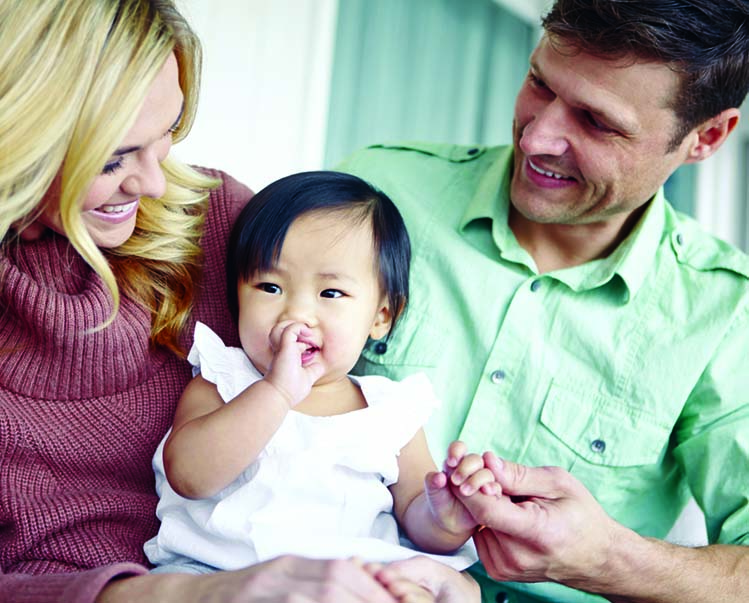Kevin and Tracy Plenzler of Winter Springs know they got lucky.
When a referral arrived in their inbox last year about adopting a 2-year-old boy from China who had been born premature and medical records showed syphilis symptoms, a hole in his heart, and a span in his brain that could signal mental issues, they had seven days to accept or decline.
Hearing about a program established by Nemours, they contacted the children’s hospital’s headquarters in Delaware to see if doctors could help them better understand the report and put matters into perspective.
“When we first read the report, it was daunting,” Tracy says. “But Nemours made it seem that we could handle any of those things.”
More Than Medical Care
In the time between accepting the referral and bringing Aaron home, Nemours launched the same program at its new Orlando facility. Its pediatricians immediately examined Aaron and delivered some shocking news: He didn’t have any special needs after all.
“It is wonderful,” Tracy says. “I know he will receive more unconditional love than if he remained in an orphanage, but he is also going to give us a much better life.”
Dr. Ken Alexander, division chief for infectious disease at Nemours, serves as lead planner for the Nemours International Adoption Medicine Program in Orlando, comprising a team of pediatric infectious diseases specialists. Dr. Alexander was involved in a similar and successful initiative at the University of Chicago.
“There is nothing like this in Orlando,” he says. “Some practices will see these kids but not offer the support of our program.”
The support is vast and comprehensive. It offers pre-adoption consultation, as well as medical and psychosocial care for internationally adopted children. Dr. Alexander is a major proponent of pre-adoption assessments, noting that while the health of the child is important, helping parents understand what they are getting into before they commit is vital.
“It is more than just making sure they do not have a disease,” he says. “That’s a small flash in the pan. Adoption is a developmental program, and it’s a brutal process. The parents should know that they may have 48 hours to make a decision on a child in Somalia who has a heart problem.”
Preparing the Parents
Following pre-adoption counseling, the Nemours program then provides support when parents travel in-country to see the child. When the child comes home, counselors also offer help adjusting the boy or girl to their new life.
“They have left everything behind,” he notes. “Friends, family, language, culture. It’s pretty scary.”
Parents have to be prepared for a gamut of circumstances, he adds, including possible stressors on their marriage or savings. They must work to fit him or her into the family dynamic and have a general idea about how to adjust the child’s digestive system to American food. Culture shock also comes into play, as does communication.
“I started interviewing parents and one said, ‘Your child never stops being adopted.’ She is right,” Dr. Alexander says. “It is like having your own biological child with more unknowns. Is she acting this way because she is a girl or because she just turned 13 or because she is Chinese?”
While much of the caseload under the Nemours program caters to children with special needs, which include cleft palates, HIV and cerebral palsy, healthy adopted children are more than welcome.
Special Needs Adoptions on the Rise
Tracy and Kevin did not start out seeking a special needs child. Following a few years of dead ends to expand their family beyond their 8-year-old son Tristan they turned to a Chinese special needs program called Special Focus that was known to expedite adoptions. The process took nine months. The average international adoption takes approximately 18 months, according to Debra Hewitt, MS, executive director and founder of the Orlando-based Sunshine State Adoption & Home Study Services.
Hewitt says more families are turning to special-needs children because it can be an easier process for those lost in the red tape shuffle. This has caused an uptick in the number of special-needs adoptions at a time when international adoptions are on the decline.
“Fifteen years ago international adoption was huge,” Hewitt says. “Most adoptions were coming from China and Ethiopia. But today, almost 80 percent of all adoptions are domestic.”
In response to this wave of special-needs children arriving stateside, international adoption medical clinics, like the one at Nemours, have become vital.
“A lot of families are now adopting special-needs children, and we need a way to serve these families,” Dr. Alexander says.
Hewitt’s assessment of a drop in international adoptions is backed up by figures recently released by the U.S. Department of State: Adoptions of international children have fallen to their lowest levels in more than 35 years. According to the report, 5,648 international adoptions were recorded in 2015, down from 6,438 in 2014 and 75 percent below a high of 22,884 in 2004.
She says the reasons for the drop in international adoptions are mainly due to politics and policies hindering the processes here in the United States and abroad. For example, to protect against child trafficking, the U.S. no longer allows adoptions from Vietnam, Cambodia, Guatemala, and Nepal. Russia now bans the U.S. from adopting its children in response to human rights allegations.
Hewitt not only launched the Sunshine State Adoption & Home Study Services non-profit organization, but she and her husband John are the proud adoptive parents of three international children – two from China, the other from Guatemala. She has helped place more than 1,000 boys and girls for families over the past 20 years, providing mandated home studies of prospective parents.
While the somewhat arduous process of international adoption has been simplified since she adopted her kids, Hewitt says fewer healthy children who need good, loving homes are being placed.
She says, “It may be much easier now, but unfortunately, fewer people are doing it.”




Comments